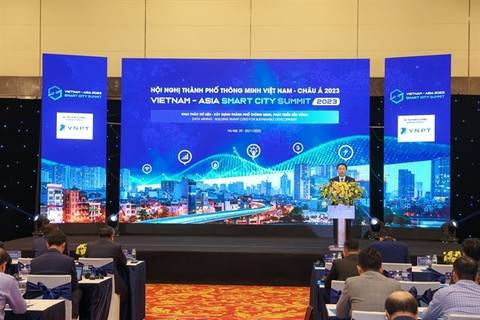
|
Getting your Trinity Audio player ready...
|
The pursuit of smart city development in Vietnam has encountered numerous hurdles despite the dedicated efforts of technology businesses collaborating with localities in planning and implementation, as highlighted at the VN-Asia Smart City Summit 2023.
The two-day event, themed “Data Mining – Building a Smart and Sustainable City,” was a collaborative effort between Hanoi’s Department of Information and Communication and the Vietnam Software and Information Technology Services (VINASA).

Primary objectives revolved around introducing Hanoi’s ambitious digital transformation and smart city development plans by 2025, with a forward-looking vision for 2030. Furthermore, it aimed to garner insights from experts and businesses, fostering partnerships between local IT enterprises and their international counterparts.
With 2023 designated as the National Year of Digital Data, the focus was on creating models for secure data collection, connectivity, and utilisation to inform urban management strategies and decisions.
Insights and successful cooperation experiences from various cities like Jakarta, Huế, and Đà Nẵng, along with contributions from industry leaders and experts, were shared during the conference. The spectrum covered smart platforms, cloud technologies, 5G solutions, IoT products, AI applications in healthcare, and innovations in smart traffic and mobility.
Chairman of VINASA’s Founding Council, Trương Gia Bình, elaborated on the collaborative endeavours of major enterprises like Viettel and VNPT in establishing Intelligent Operations Centres (IOCs) across provinces and districts, along with initiatives by FPT to infuse urban planning with intelligence and AI.
These technology companies have been at the forefront, offering innovative solutions such as AI, IoT, and 3D Digital Maps to enhance the management of various departments, agencies, urban areas, and industrial parks nationwide.
However, the foremost challenge highlighted for smart city development lies in the ambiguous legal framework that does not favour public-private cooperation, particularly in investment, bidding processes, and IT service procurement. Additionally, inadequate emphasis on smart planning and fundamental infrastructure in urban areas further compounds these challenges.
Trương Gia Bình stressed the necessity for Hanoi to establish distinct mechanisms for attracting both local and international talent while spearheading comprehensive IT training initiatives encompassing hardware and software aspects.
Yudhistira Nugraha, Director of Jakarta Smart City, believes that the essence of smart cities transcends technology, underscoring the need to enhance happiness, quality of life, economic growth, and sustainability for citizens. He highlighted Jakarta’s implementation of Citizen Relation Management, an interactive platform fostering citizen-government communication and resolving civic issues efficiently.
Nguyễn Huy Dũng, Deputy Minister of Information and Communications, reiterated that smart city development involves a holistic approach to address key urban issues like traffic, environment, energy, waste management, and security. He emphasized the integration of smart elements into urban planning and the inseparable link between local smart city development and the broader digital transformation process.
Chairman Trần Sỹ Thanh of the Hanoi People’s Committee envisions a sustainable smart city model prioritizing a high-quality living environment, administrative efficiency, and robust support for the digital economy. He emphasized the centrality of smart choices, solutions, and technology in shaping Hanoi’s sustainable development.
The summit served as a platform to deliberate on challenges, seek solutions, and redefine perspectives on smart city growth and sustainable development. The culminating smart city award announcement and honouring ceremony highlighted outstanding smart city development trends in Vietnam, underscoring the nation’s commitment to embracing innovation for a smarter future.
















